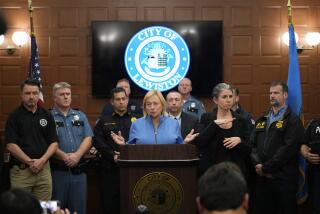To Boldly Get Out of Here Is a Good Idea
At the risk of being lumped in with the “flying saucer” people, I think it is imperative that we get some representatives of humankind off the planet and into space relatively quickly and definitely permanently.
Two recent news items and a perennial and growing threat got me thinking about this. The first news item was about a meteorite -- the size of a house -- that fell last week off the coast of Australia. No one had a clue it was coming.
This minor warning shot from the cosmos is important because it punctuates the fears of a number of astronomers who believe that Earth is long overdue to be hit by an asteroid or comet. Should a miles-wide monster collide with Earth, it could kill a hemisphere or even the planet.
Just last year, an asteroid came within 25,000 miles of Earth. Two very bad things about that near miss. In astronomical terms, 25,000 miles is akin to missing the Earth by 1/1,000th the width of a human hair. Also, no one saw it coming, and no one knew about it until three days after it had passed. Conservative estimates indicate that there are hundreds of “planet killer” asteroids out there that we have yet to discover or track.
The second interesting news item came from the lips of Lord Ron Oxburgh, chairman of Shell Oil, who stated that he was “really very worried for the planet.” Politics and varied views of global warming aside, Lord Oxburgh’s opinion would seem to carry some weight on this subject. In an interview with the Guardian last week, he discussed the need to capture emissions of carbon dioxide and store them underground -- a technique called “carbon sequestration.” Oxburgh maintained that “sequestration is difficult, but if we don’t have sequestration, then I see very little hope for the world.”
Oxburgh was not speaking on behalf of the Sierra Club, Greenpeace or some “left-leaning” environmental group. He is the chairman of one of the world’s largest oil companies, and his words are about to cause more than just a ripple.
Last, we have the perennial and growing threat that, leaving aside an “act of God,” the human race is more than capable of destroying itself. Whether it is terrorism, war or by accident, technological advances and our ever-increasing ignorance and intolerance have put us at great risk. The world’s arsenal of nuclear, chemical and biological weapons stand poised to alter or destroy life as we know it.
So, if Earth is rocked by an asteroid, global warming destroys all life or we unleash the evils created by our own hands, where does that leave the future of humankind? Extinct.
Common sense, political leadership and civic responsibility would seem to cry out for an option to save the human species. An option that means getting us off the bull’s-eye.
Sadly and maybe tragically, fear of being ridiculed or perceived lack of voter interest is preventing most politicians from looking toward space.
While politicians evade their responsibility, planet killers scream unchecked through the solar system, our climate goes through suspicious changes and terrorists are one day closer to their goal of using weapons of mass destruction.
For the sake of posterity, we need to get some humans off the planet. If government can’t or is unwilling to do so, then maybe this week’s successful flight of SpaceShipOne demonstrates that the private sector is ready to take the first steps.
More to Read
Start your day right
Sign up for Essential California for news, features and recommendations from the L.A. Times and beyond in your inbox six days a week.
You may occasionally receive promotional content from the Los Angeles Times.






